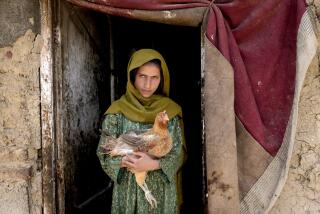Afghans’ Long Road Back
- Share via
One year after the United States forced the Taliban from power in Afghanistan, reconstruction of the shattered nation is proceeding slowly. U.S. military civil affairs units have done good work to build schools, dig wells and clear canals full of rubble. So President Bush was right to say on Friday that the nation has “entered a new era of hope.” But major projects like building highways to connect the main cities remain stalled, and the central government is having trouble outmaneuvering warlords and extending its writ to all corners of the land. So that hope is fragile.
We agree with aid workers’ complaints that too much money is going to firms for the design of massive projects such as dams and power plants. More, they say, should be spent on actual construction of roads, houses and schools. And foreign donors should channel much of that money through the central government of President Hamid Karzai rather than through nongovernmental organizations. Afghans need to see Karzai’s government employing people to make the bricks, build the scaffolding and mix the cement for new structures.
Now warlords are paying their followers more than the government can afford. That has bolstered fiefdoms ruled by many of the same men who battled among themselves for years and caused such chaos that Afghans at first applauded the Taliban for ending the violence and imposing order. The more entrenched the warlords become, the less Karzai’s government can impose its will, the greater the chances that civil war will again break out.
The warlords’ influence could be diminished if countries stationed their international peacekeeping troops in cities other than Kabul, the capital. Foreign soldiers could shield villagers from extortion by tribal thugs and reassure them they will be safe when they clear their land and plant crops. The U.S. Senate Foreign Relations Committee has urged the Bush administration to push allied nations to send peacekeepers to such cities as Kandahar and Herat.
Afghanistan also needs money to rebuild its institutions. It has established commissions to deal with human rights, a new constitution and the judiciary--necessities for the long-term stability of a nation torn apart by the Soviet invasion of 1979 and subsequent warfare.
U.S. officials say about 65% of the nearly $2 billion that foreign donor nations promised to Afghanistan for this year has been spent or is in the pipeline to be spent on future projects. Washington should push countries that have lagged in fulfilling their pledges to come up with the other 35%. After the moujahedeen defeated the Soviets, most nations forgot about Afghanistan. The Taliban and Al Qaeda did not. The world should not forget the country again.
More to Read
Sign up for Essential California
The most important California stories and recommendations in your inbox every morning.
You may occasionally receive promotional content from the Los Angeles Times.










